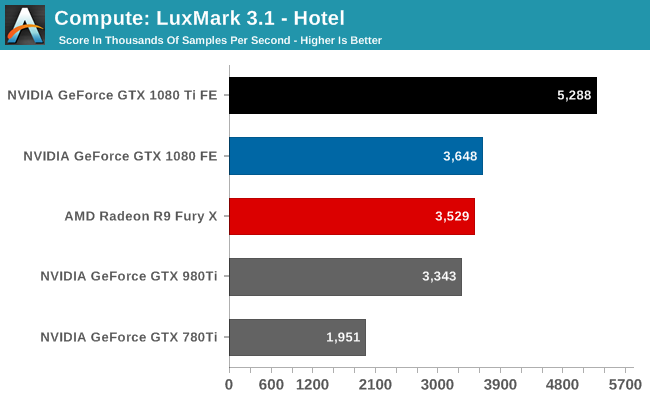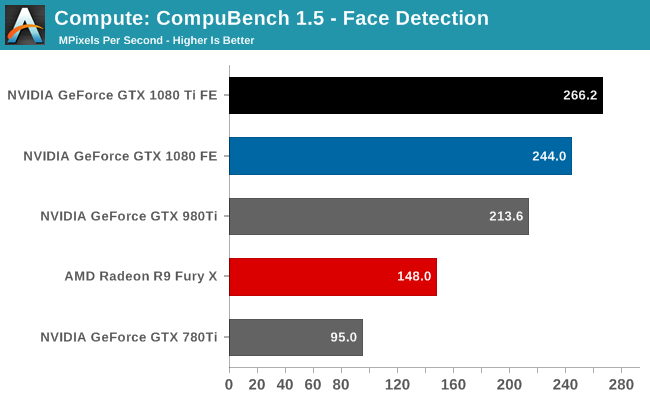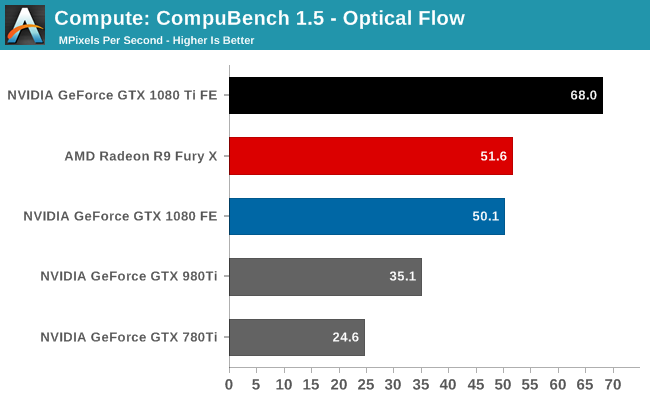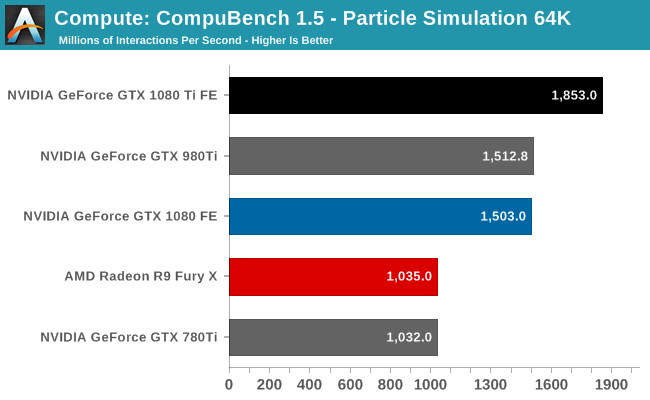The NVIDIA GeForce GTX 1080 Ti Founder's Edition Review: Bigger Pascal for Better Performance
by Ryan Smith on March 9, 2017 9:00 AM ESTCompute
Shifting gears, let’s take a look at compute performance on GTX 1080 Ti.
Starting us off for our look at compute is LuxMark3.1, the latest version of the official benchmark of LuxRender. LuxRender’s GPU-accelerated rendering mode is an OpenCL based ray tracer that forms a part of the larger LuxRender suite. Ray tracing has become a stronghold for GPUs in recent years as ray tracing maps well to GPU pipelines, allowing artists to render scenes much more quickly than with CPUs alone.

The OpenCL situation for NVIDIA right now is a bit weird. The company is in the middle of rolling out OpenCL 2.0 support to their video cards – something that I had actually given up hope on until it happened – and as a result their OpenCL drivers are in a state of flux as company continues to refine their updated driver. The end result is that OpenCL performance has dipped a bit compared to where the GTX 1080 launched at back in May, with said card dropping from 4138 points to 3648 points. Not that the GTX 1080 Ti is too fazed, mind you – it’s still king of the hill by a good degree – but the point is that once NVIDIA gets their drivers sorted out, there’s every reason to believe that NVIDIA can improve their OpenCL performance.
For our second set of compute benchmarks we have CompuBench 1.5, the successor to CLBenchmark. CompuBench offers a wide array of different practical compute workloads, and we’ve decided to focus on face detection, optical flow modeling, and particle simulations.



Like LuxMark, CompuBench shows some minor performance regressions on the GTX 1080 as compared to the card’s launch. None the less, this doesn’t do anything to impede the GTX 1080 Ti’s status as the fastest of the GeForce cards. It dominates every sub-benchmark, including Optical Flow, where the original GTX 1080 was unable to pull away from AMD’s last-generation Radeon R9 Fury X.










161 Comments
View All Comments
ddriver - Friday, March 10, 2017 - link
Yeah, also amd was free to offer discounts to those who didn't sell intel products. They helped make two games, and gave Larry who only sells amd systems a free amd t-shirt as a reward. Because that's what amd can afford, after years of being sandbagged by intel and Hecktor made it buy ati for 3 times what it was worth so it can go bankrupt so it will be forced to sell its fabs to Hecktor's arab boyfriends.eddman - Friday, March 10, 2017 - link
You did not answer the question.Being known in the industry for many years, yet nothing has happened.
ddriver - Friday, March 10, 2017 - link
What nvidia does is the same thing as lobying. It is legalized bribe. You cannot give a briefcase of money to a politician and tell him to do what you want him to. But you can spend a briefcase of money to make a politician do what you want him to do. And it is not illegal, politicians have legalized it, and as far as they and the lobbyists are concerned, that is a good thing, a political contribution.The same kind of advantage that allows nvidia to do that is what would give them the upper hand in court. It could be proven to be a crime, if only amd had enough money to out-sue nvidia. Which they don't. And if they did, they'd be able to support game developers, so it wouldn't even come to that. nvidia is friends with the big boys, amd is a perpetual underdog. In such scenarios, even if a lawsuit was to take place, it would be mostly a show for the public, and if found guilty, the punishment would be a symbolic and gentle slap on the wrist.
Now, with your question answered, do you feel better?
ddriver - Friday, March 10, 2017 - link
There is high likelihood that we will see such a case against nvidia, but not until they have completely cemented their dominance position, and that case would only serve to wipe nvidia clean, so they can enjoy their dominance without being haunted by their past of sleazy illegal practices, giving them a clean slate at a very desirable price.eddman - Friday, March 10, 2017 - link
So it is not illegal to help devs doing optimizations?ddriver - Friday, March 10, 2017 - link
It can be as legal or illegal as killing people. What nvidia does is most certainly unfair business practices and abuse of its position.The legal system is rarely about what is right or wrong. What nvidia does is certainly wrong. If they can get away with it, it is legal. If someone kills your entire family and then walks free because the legal system found him to be innocent, would you be as OK and defending his innocence as you are doing for nvidia?
eddman - Friday, March 10, 2017 - link
That comparison isn't even remotely relevant.Companies work with devs in the entire computing industry all the time to make sure software works best with hardware. It has never been illegal.
ddriver - Friday, March 10, 2017 - link
Are you by a chance on the spectrum? There is nothing wrong with helping to optimize software. For the last time - what is wrong is offering that help on implied exclusive terms. I don't know people who have been offered support by amd in exchange of sandbagging nvidia. But I know people who eventually optimized for amd and as a result lost the support nvidia offered prior to that. And the revenge didn't end there either, subsequent driver releases significantly worsened the performance of the already nvidia optimized code.nvidia doesn't help out of the kindness of their hearts or awesomeness, they do not even help to make the best out of their hardware, they only help if that would get them an unfair advantage, so it is implied that their help is only available to those who leave the amd rendering pipeline deliberately unoptimized.
eddman - Saturday, March 11, 2017 - link
...and some other people tell otherwise. Who to believe. Can you provide anything solid to back that up?"subsequent driver releases significantly worsened the performance of the already nvidia optimized code"
Which games? Which drivers? This one can be tested.
Why would nvidia reduce the performance of a game on their own cards, which is going to hurt them? The whole purpose of this was to make the game work best and sell cards based on that.
eddman - Saturday, March 11, 2017 - link
What about you? Are you on the spectrum?